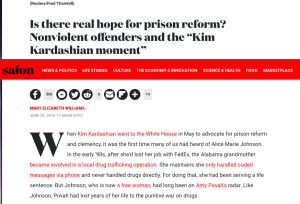 Back in the late ’80s, a few years into her marriage to her now ex-husband, Povah discovered that he had been involved in an international ecstasy business. He asked her to handle some “financial matters” for him while he was dealing with some legal wrangling. At her trial, there was no evidence she’d sold drugs or been directly involved with the dealers. The ex eventually served four years in prison. For conspiracy, Amy was sentenced to 24.
Back in the late ’80s, a few years into her marriage to her now ex-husband, Povah discovered that he had been involved in an international ecstasy business. He asked her to handle some “financial matters” for him while he was dealing with some legal wrangling. At her trial, there was no evidence she’d sold drugs or been directly involved with the dealers. The ex eventually served four years in prison. For conspiracy, Amy was sentenced to 24.
“As is so often the case with conspiracy laws,” she now says, “you can just be one spoke in the wheel and no clue what your network is.” And you can wind up incarcerated indefinitely.
Grassroots efforts for justice for Povah kept her story from being completely forgotten, and a 1999 Glamour magazine feature on her plight helped lead to her sentence being commuted under the Clinton administration. She had served nine years. “It’s been a long journey,” she says.
Today, Povah is the founder of CAN-DO, a nonprofit foundation whose shorthand name stands for Clemency for All Nonviolent Drug Offenders. The organization seeks to educate the public about drug conspiracy laws and advocate for those currently incarcerated under them. Back in 2015, Povah put Alice Marie Johnson at the top of her list of women who deserved clemency.














